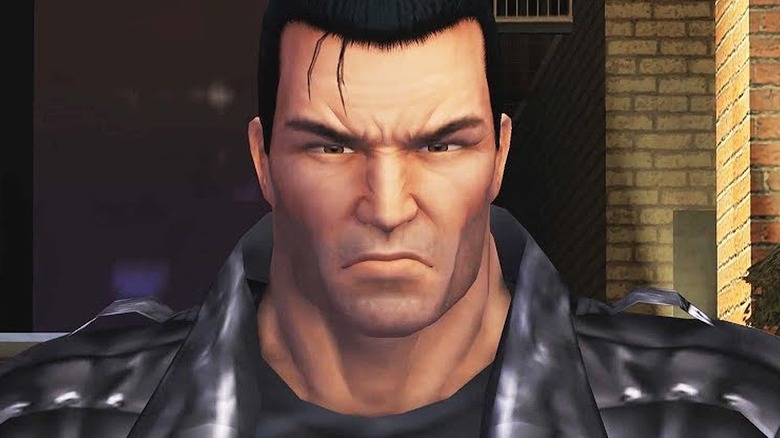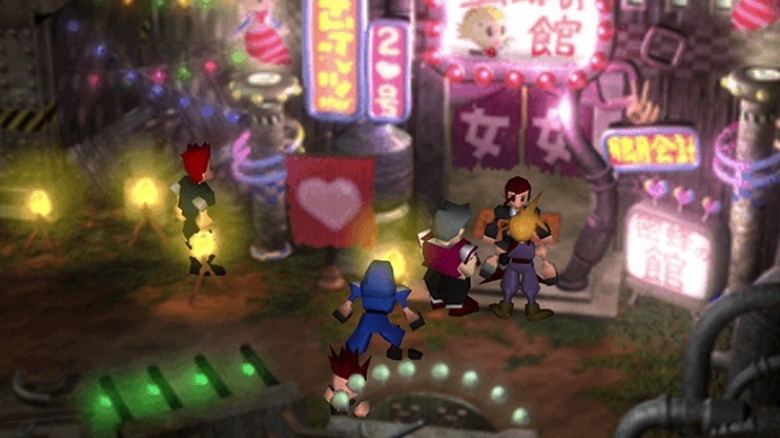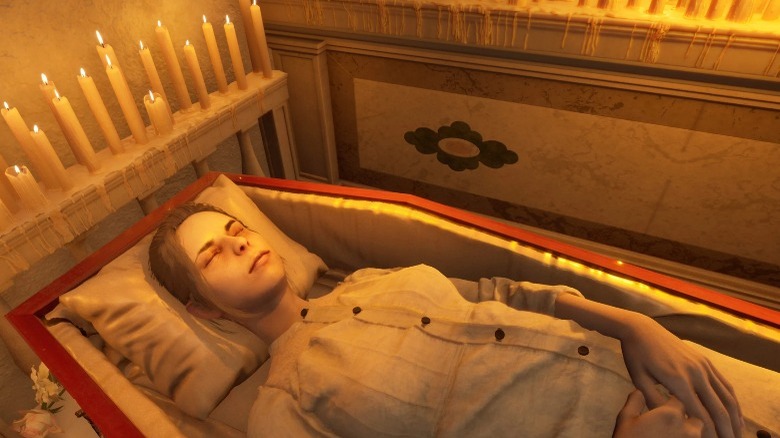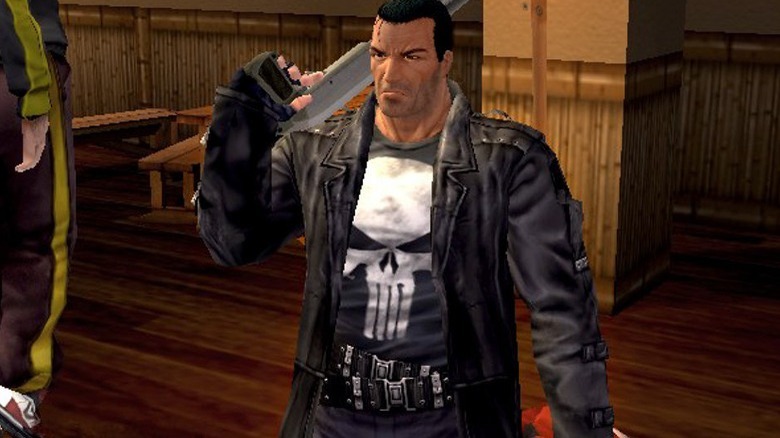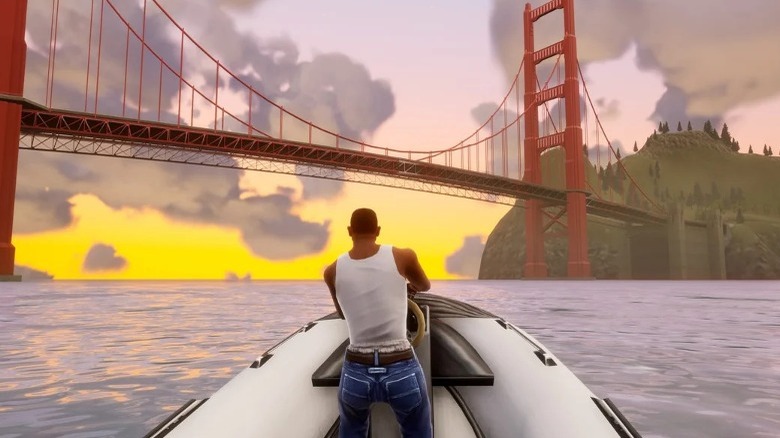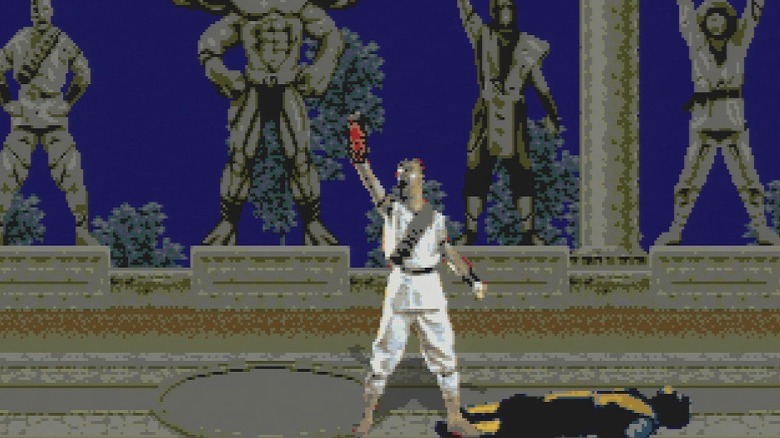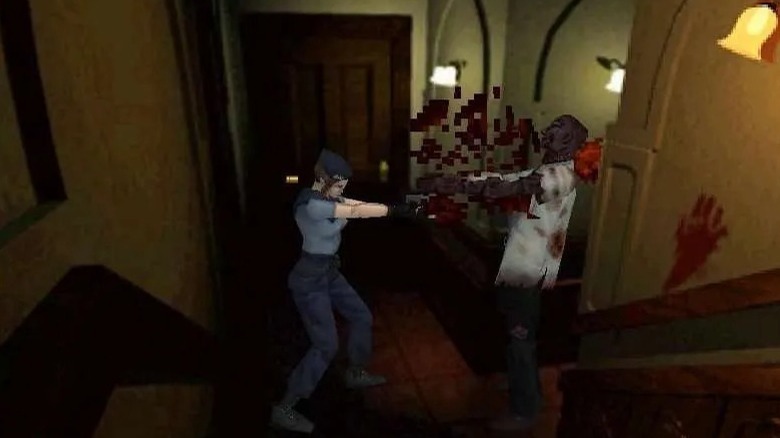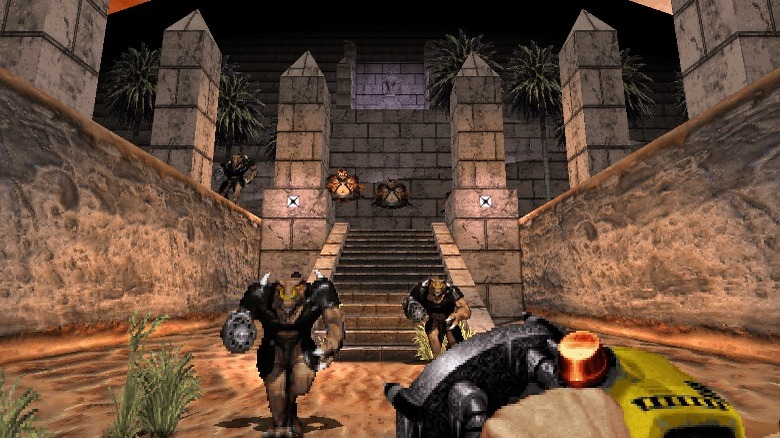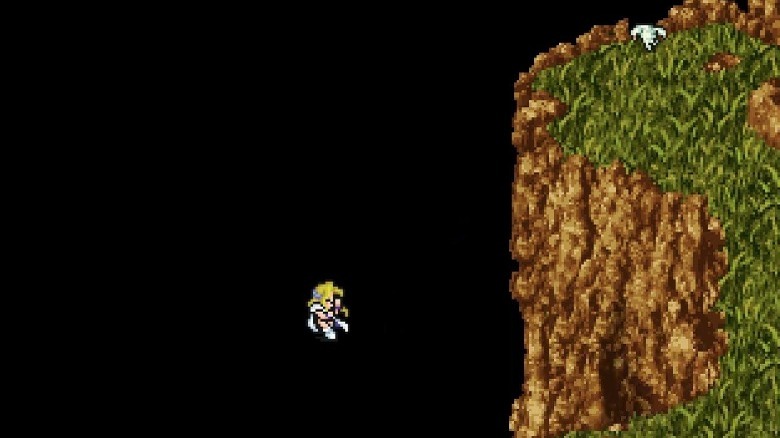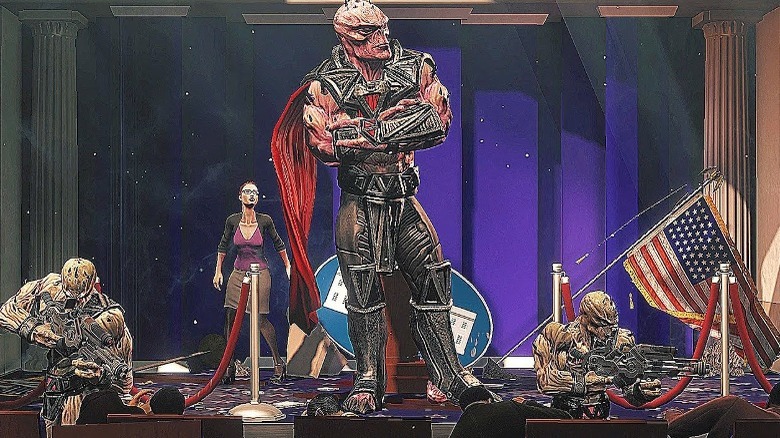Why These R-Rated Scenes Were Cut From Video Games
Video games can be magical experiences. They transport players to other worlds and let them inhabit other lives, but unlike any other form of media, games put players in control of how it all plays out. Maybe that's why so many people are quick to judge games that include adult themes or graphic content, because they make some players appear complicit in said content. When R-rated movies go too far, they get a bad review, but when games do something similar, censors come out of the woodwork.
There's a long history of censorship in games, and it's not always for the good of the final product. Every once in a while, censorship can even cause to spark a greater interest in certain games, making a few controversial titles more popular than ever. On the other hand, there are times where games legitimately do push things a bit too far. Those moments are generally caught by the developers before the game ever sees the light of day, but not always.
Most of the time as a player, you won't even realize that there's a scene or gameplay element missing from your experience. Other times, it's painfully obvious that something has been covered up. We've compiled a number of video game edits — both reasonable and ridiculous — and presented them here to share why these R-rated scenes were cut.
Final Fantasy 7's original Honeybee Inn went too far
The original "Final Fantasy 7" is one of the most popular games of all time, and it's full of mature content. The main plot includes murder, terrorist attacks, and more — but there's one location in particular that stands out to video game audiences who, let's face it, are mostly a bit numb to violence in their media. The Honeycomb Inn is a thinly veiled brothel that players can visit during the early hours of the game. Believe it or not, the inn was once planned to be much more up front about its operations.
There's cut content buried in the original game's code that reveals just how explicit the Honeybee Inn once was. The lobby originally had posters showing off the different girls that visitors might hire during their stay. There were even lists of prices tagged with different innuendos, so players could discover exactly what services the inn's typical patrons were interested in.
Where the original draft of the inn really went too far was with the inn's tie-in to Cloud's infamous Don Corneo quest. Cloud could collect "Mystery Panties" from one of the inn's customers who apparently stole them from a laundry line, and there were heavy implications that the underwear actually belonged to a child. Some deleted scenes serve to enhance their source material, but this is one section that the devs were right to rethink.
Martha is Dead got edited by Sony
Most of the time when scenes get removed from a video game, it's because the developers decided that they wanted to take things in a different direction. Every once in a while a publisher might step in to make a change, but it's pretty rare for changes to be forced by people who had nothing to do with a game's development at all.
That's what happened to "Martha is Dead," a horror game developed by LKA and published by Wired Productions. The game was set to release simultaneously for Windows, PlayStation 4 and 5, and the Xbox One and Xbox Series X|S, but just over a week before the launch, players learned that the PlayStation experience would be a bit different than the devs had intended. Specifically, PlayStation insisted that the interactivity be removed from a gruesome scene in which the player character cuts into a corpse, and some verbal sexual references were also dropped entirely.
"The changes in content were made as a result of conversations with PlayStation in the lead up to our launch," Neil Broadhead of Wired Productions told IGN. Wired Productions stressed that the game's story was left virtually untouched by the changes. That's good news for anyone who wants to play the game on a PlayStation console, but fans still felt it was strange that Sony stepped in to mandate console-exclusive censorship in the first place.
The Punisher: Now with less violence!
The year was 2005. The MCU won't exist for another four years, but "The Punisher," directed by Jonathan Hensleigh, had just put Marvel's most violent hero on the big screen the year before. Critics weren't in love with the movie, but this video game managed to secure an audience and tested the limits of how graphically violent games of the time were allowed to be.
In the comics, the Punisher is known for being so brutal that he stretches the definition of what a hero is, even as he shares scenes with heroes like Iron Man on-and-off-screen. Frank Castle is hellbent on murdering evildoers and avenging his lost family, but he also seems determined to deal with his enemies in the most painfully violent ways imaginable. The game really leaned into that sadistic aspect of the Punisher's character — and it went far enough that some scenes had to be toned down so it could actually be released.
Ratings boards in the US and the UK had a particular problem with the interrogation scenes that were sprinkled throughout the game. To get the info he's after, the Punisher would smash, cut, and torture his enemies with whatever supplies were in the room, whether that be a drill or a buzzsaw. The final release version of the game cut down on the interrogations and threw different camera angles and a black-and-white filter on the executions, or simply cut to black altogether. The missing content might have watered down Marvel's most violent hero, but it also allowed the game to see the light of day.
GTA's Hot Coffee incident
When it comes to game series that push the envelope on acceptability, "Grand Theft Auto" is kind. The games are filled with crime, violence, sex, and raunchy humor, and they've been that way from the very beginning. Not everyone appreciates what "GTA" has to offer, but there was one time in the series' history when developer Rockstar actually had to remove content from a game.
"Grand Theft Auto: San Andreas" accidentally caused a massive stir that led to the game becoming a topic of debate in the United States Congress. Shortly after launch, hidden code in the game was uncovered with a mod called "Hot Coffee," which gave players access to a sex scene mini-game that wasn't intended to be playable in the final release. While fans of the series might have been amused by the discovery, the rest of the world seemingly wasn't. Australia banned "San Andreas" outright, and it initially received an Adults Only (AO) rating in the United States, causing many retailers to drop the game. Meanwhile US Senators, including Hillary Clinton, were so outraged by the mini-game that they proposed federally regulating the ESRB. A class-action lawsuit against Rockstar and Take-Two Interactive cost the "GTA" publisher $20 million.
Rockstar eventually earned back the game's Mature rating by re-releasing it with the "Hot Coffee" code completely removed. Disaster was averted — but oddly enough, the code that sparked the controversy would resurface years later. In 2021, dataminers discovered the code for the scene buried in "Grand Theft Auto: The Trilogy – Definitive Edition." Congress didn't get involved this time around, but Rockstar did temporarily pull the PC version of the trilogy from sale.
Mortal Kombat without the Fatalities
"Mortal Kombat" is essentially known for two things: fantastic fighting mechanics and over-the-top violence. The original game wowed arcade players in 1992, in part because its digitized graphics were so fantastic for the time. The feeling of pulling off a Fatality was completely matched by the game's novel visual flair, and those signature finishers became synonymous with the series.
If you removed Fatalities from "Mortal Kombat," the series wouldn't be the same, but that didn't stop Nintendo from trying. When the company decided to bring the original arcade game to the Super Nintendo in 1993, the home console version of the game completely changed the Fatalities. Nintendo censors removing all the gore from the game, replacing blood with spit and essentially turning Fatalities into regular attacks with a flashy name. Considering the massive public outcry caused by "Mortal Kombat," which eventually led to the creation of the ESRB, it's hard to fault Nintendo for playing it safe. The company had a family-friendly identity to uphold, after all, but it also wanted to snap up a massively popular game.
"Mortal Kombat" co-creator Ed Boon has said that he completely understood why Nintendo made the decision to tone down the violence. "Nintendo felt like they had an obligation to not offer something like this to a system that's played by many young players," he told Eurogamer. Now that there's a rating system in place, it's easier for companies to release mature content on their platforms — though clearly that doesn't always work out.
Resident Evil: Director's Cut...or not
Sometimes scenes get removed from games to appeal to different markets. That's what happened with the original "Resident Evil," but it's not where the story ends. The game debuted in Japan and quickly climbed to fame around the world. Players in the US and Europe who excitedly dove into the game were treated to a slightly different experience than their Japanese counterparts, however. The live-action intro scene that starts off the game was massively edited outside of Japan, with a black-and-white filter and some careful camera cuts removing the most violent parts of the scene.
Fans obviously wanted to be able to get the full "Resident Evil" experience, and in 1997 Capcom claimed to offer them just that. "Resident Evil: Director's Cut" was supposed to restore all the content that English-speaking players missed out on during their first playthrough, but it didn't. While the "Director's Cut" did add back in some minor moments throughout the game, the original live-action intro was still missing. Capcom claimed that a publishing mistake caused the scene to be removed completely by accident.
Luckily, modern technology can sometimes fix mistakes of the past. "Resident Evil" fans are a dedicated bunch, and in 2021 a fan-made patch restored all the content that's been missing these past several years. Now you can experience the original "Resident Evil" in all its bloody, gleefully silly glory.
Family friendly Duke Nukem?
"Duke Nukem" is an FPS franchise known for fun gameplay, sprawling levels, and a sense of humor that's probably best described as juvenile. It's a series you can rely on for all manner of adult content, from extreme violence and titillation to foul language and inappropriate jokes. "Duke Nukem" is still an important part of gaming history, however, and it very much occupies its own place in the industry.
That place is not on Nintendo consoles – or at least, it probably shouldn't be. In 1997, Nintendo ported the incredibly popular "Duke Nukem 3D" to the Nintendo 64, but to make the game fit in with Nintendo's brand image, the company had to make some healthy edits to the material. All of the nudity and much of the intense violence had to be stripped out of the game before it came to the Nintendo 64, but one of the most dramatic structural changes is that the entire first level was virtually removed.
"Duke Nukem 3D" opens with the titular hero exploring a "Red Light District" level, blasting baddies as he makes his way through adult video stores and a massive gentlemen's club. Originally, anyway. Nintendo renamed the level "Gun Crazy," turned the adult tapes into guns, the alcohol into soda, club itself into a burger joint. "Duke Nukem 64" is very much a watered down experience, but it still gave a new swath of gamers a taste of the series.
Perking up in Final Fantasy 6
Not all of the mature content in video games centers around sex and violence. "Final Fantasy" has long been known for its willingness to explore deeper life problems and complex adult relationships. One of the best examples of this is "Final Fantasy 6," which delved into some heavy topics.
At one point in the game, a character named Celes believes that she's hit rock bottom. Her world has just been conquered and partially destroyed by the mad soldier Kefka. She's stuck on an island, separated from everyone she knows, and she's just watched one of her friends die. Celes remembers that others on the island had taken their own lives by jumping off a cliff into the sea. Believing that she has nothing left to live for, she does the same. When she washes up on shore, she resolves to leave the island, reunite with her friends, and save the world.
It's an incredibly dark moment in the story, but it's also deeply powerful. It's also something that a huge number of players never got to experience. When the game came to the US, Nintendo of America's content policies required the scene to be changed. On the SNES, Celes remembers that some of the island's previous inhabitants would leap off the cliff to "perk up," and so she decides to do the same. It's a change that completely upends not only what happens in the scene, but also the entire emotional arc of Celes' story. On top of that, it's a baffling choice to frame this as something she's doing to make herself feel better.
Australia says no to drugs in Saints Row 4
Sometimes, what might seem like a small detail to game developers or their fans can actually cause massive problems. Volition learned this firsthand when "Saints Row 4" was nearly prevented from being released in Australia. Ahead of the game's scheduled release, the Australian Classification Board (ACB), which is similar to the ESRB, outright refused to give "Saints Row 4" a classification. For the developers, this was a fate worse than getting an AO rating, because it meant that the game simply could not be legally sold in Australia.
In a statement provided to The Guardian, the ACB explained, "The game includes elements of illicit or proscribed drug use related to incentives or rewards." In other words, drugs are allowed, but depicting a character benefiting from their use is not. Volition eventually made the decision to cut an entire mission in which players discover some alien drugs, smoke them, and temporarily gain out-of-this-world superpowers. Along with that, the developer had to cut a weapon called the Rectifier, which was basically an invasive alien probe.
The changes ultimately allowed Australian gamers to play "Saints Row 4" without getting a wildly different experience from people in other parts of the world. And hopefully no one outside of Australia was tempted to smoke alien drugs after playing through the game.

